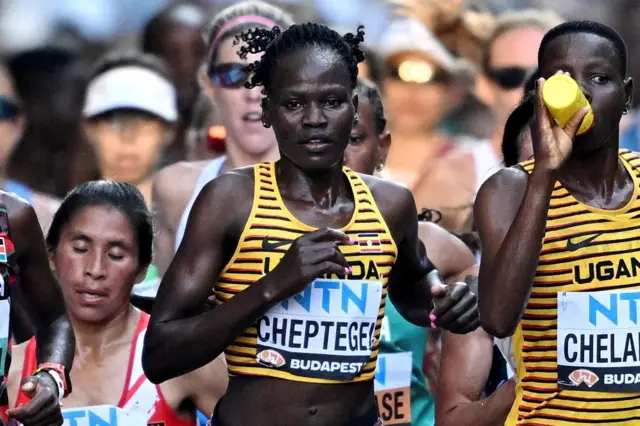WITH a record 20 World Championship and 11 Olympic medals to her name, Allyson Felix is the most decorated track and field athlete of all time.
And not content with simply trailblazing on the track, in recent years she has become a fierce advocate for women, particularly in the realm of maternal health rights.
With violence against women athletes overshadowing the sport this year, Felix tells BBC 100 Women that she is greatly concerned for the safety of women athletes in some parts of the world.
“There has to be a change in the culture. Something is not right, and it does make me worry,” she says.
Felix says she was devastated to hear the news of the death of fellow Olympic athlete Rebecca Cheptegei, who was set on fire by her boyfriend in Kenya earlier this year.
The mother-of-two was the third female athlete to be killed in Kenya in three years.
Felix says it’s a “real problem” that she will prioritise as a recently elected member of the IOC Athletes’ Commission, a body that represents athletes within the Olympic movement.
“The consequences have to be severe, but I think there has to be more than that,” she says. “I think we have to rally around the sports community and come together.”
‘We shouldn’t be an afterthought’
The American runner, who retired in 2022, is one of the women featured on the BBC’s 100 Women list, which each year names 100 inspiring and influential women around the world. This year the list is focusing on the theme of “resilience”, which is particularly apt in Felix’s case.
In 2018, when 32 weeks pregnant, she was diagnosed with severe pre-eclampsia and given an emergency caesarean. Her daughter, Camryn, spent time in a neonatal intensive care unit.
The following year, in a powerful op-ed for The New York Times, Felix took on her then-sponsor, Nike, over maternity pay, revealing Nike’s threat to cut her pay by 70% if motherhood affected her future athletic performance.
Three months later, Nike changed its stance and new contracts guaranteed an athlete’s pay and bonuses for 18 months around pregnancy. Three other athletic apparel companies also introduced maternity protection for sponsored athletes.
In her article, Felix wrote pregnancy was “the kiss of death” in her industry.
“I was terrified what the consequences would be. I was terrified how it would be received. It just wasn’t in my nature. And so it was really difficult to be able to just be vulnerable,” she says.
The decision to speak out could have ended her career, but less than a year after giving birth, Felix made history when she secured her 12th World Championships gold medal in the 4x400m mixed relay in Doha, surpassing Usain Bolt’s record.
Felix has since carved out a new path for herself.
Two years after parting with Nike, she launched a footwear company with her brother, Wes, in 2021, selling athletic-inspired footwear modelled on women’s feet.
This year, the mother of two was instrumental in ensuring there was a nursery in the Olympic village – the first ever available to athletes competing in the Games.
She considers it a huge win, but says more needs to be done.
“When you do come back, that’s a huge barrier to be able to re-enter the sport and figure out travelling the world and who is caring for your child,” she says.
“To be able to take something off of that plate, that’s what I look to do.”
Going forward, she wants to see sponsors change the way they represent women athletes.
Her newest venture, Always Alpha, is a management firm dedicated exclusively to women’s sports, which she says is part of her legacy.
“Traditionally, women have been put in the same box [as men]. I think women shouldn’t be an afterthought, especially as we think about the business and how strategy is created.
“In all of the negotiations with Nike, I was dealing with a team of all men, who were basically telling me how I would come back from childbirth. Now there are more women who have seats at the table and have power, but we still have a long way to go.”
Part of her role with the Athletes’ Commission will be listening to other athletes and advocating on their behalf.
“If it is your decision to have a child in the midst of your career, then do that,” she says. “We’re working really hard to support women who make that choice.”
Implicit bias
Felix, who gave birth to her second child this year – her son, Trey – has also been very vocal in highlighting the disproportionately high risk of maternal mortality among black women in the US.
This year she was awarded a $20m grant from Melinda Gates, to improve maternal health outcomes. She has not ruled out using the money to support global projects.
“I have most of my experience in the US and in my own communities, but I am actively speaking to organisations all over the world,” she says.
According to the Centers for Disease Control and Prevention (CDC), black women in the US are three times more likely to die from a pregnancy-related cause than white women.
“There’s still an implicit bias in our healthcare system, and we’re not seeing the numbers change quick enough,” she says.
Felix believes that women are too often being ignored when they report concerns to their doctors.
“What I hear is that they are not being heard,” she says. “It’s not going to turn around if we’re not educating our medical professionals.”
Felix says having a daughter makes the subject of women’s health “very personal”.


